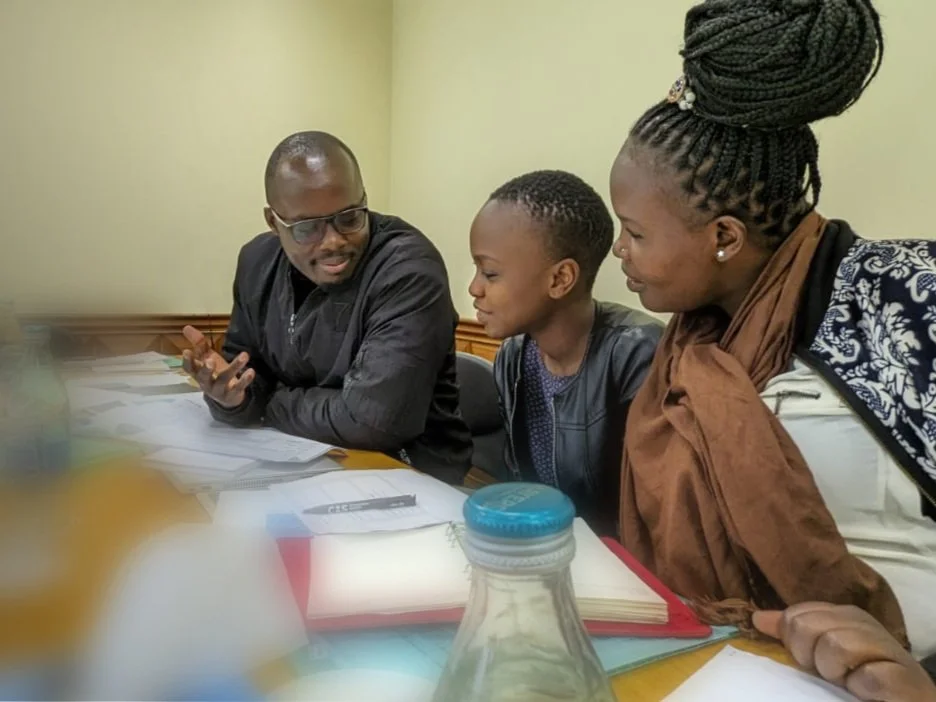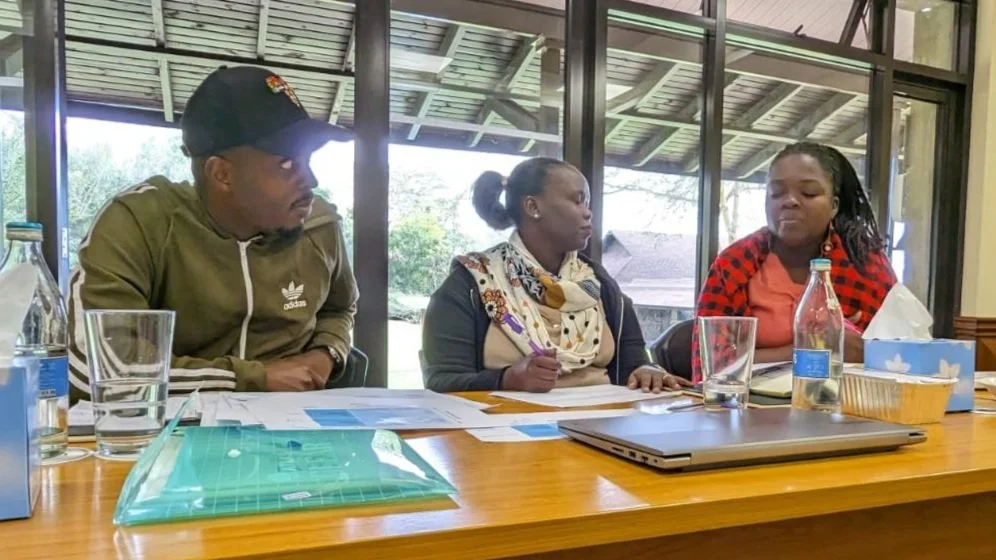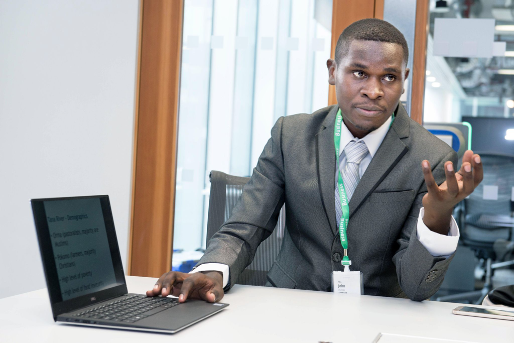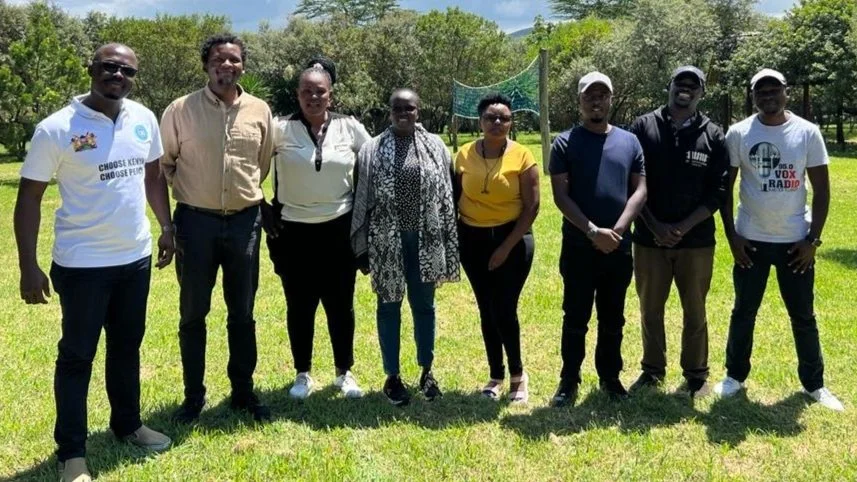Fellowship on Understanding and Addressing Harmful Polarization in Kenya
About the fellowship
This fellowship equipped Kenyan civil society leaders with tools, training, and relationships to analyze and address harmful polarization and to strengthen related work in peace-building, violence prevention, democracy and governance, and human rights. It explored how narratives and strategic communications polarize communities, positioning leaders to use these same tools to instead build positive change in Kenya.
About the context
Harmful forms of societal polarization make addressing other core issues–whether violence, extremism, democracy and governance, and human rights–all the more challenging. While polarization in Kenya intensifies amid general elections, factors including the COVID-19 pandemic, the looming drought, and the rising cost of living have all interacted with and deepened division. Indeed, beyond elections, equally important cultural, economic, ecological, and religious dynamics have all shaped polarization across the country.
To effectively address polarization in Kenya, it is critical for leaders working in human rights, violence prevention, and related issues to understand how different dynamics intersect and overlap to drive polarization, and to learn effective strategies for interrupting and counteracting them.
Meet the fellows
-
East Africa Program Manager, Sentinel Project; Co-founder, Amani Center CBO
John is the East Africa program manager for the Sentinel Project and a co-founder of Amani Center, a community-based organization focused on peacebuilding in Eastern Kenya. In his role, he leads project teams in Kenya, Uganda, South Sudan, and the Democratic Republic of the Congo, overseeing the planning and implementation of various initiatives in these countries. John possesses over a decade of experience in project coordination and management, with a strong emphasis on humanitarian contexts and fragile environments. In 2018, John received recognition for his work when he won the Commonwealth Digital Challenge Award in the United Kingdom. His expertise in utilizing information and communication technology (ICT) for promoting peace has garnered attention on international platforms, where he has been invited to speak and write about this subject. John's academic achievements include a Bachelor of Arts in International Relations from Makerere University of Kampala, a Masters in Project Planning and Management from the University of Nairobi, and a Masters in Refugee Protection and Forced Migration from the University of London School of Advance Studies.
-
Social Change Activist,
Nyakach Sub-County – District Peace CommitteeCharlet is a volunteer with the Cross-border Peace Committee and Afrinov and a social change activist whose work is focused majorly on peace building. She is currently working on efforts to address conflict issues related to natural resource conflicts in the Sondu and Nyakatch areas on the border of Kericho and Nyakach. Her goal is to inspire the next generation to have confidence in their problem solving abilities.
-
Executive Director, Tribeless Youth
Wanjiku Kihika, the visionary Founder and Executive Director of Tribeless Youth, stands at the forefront of a movement aimed at cultivating peaceful coexistence among Kenyan youth, free from negative ethnic biases. Her passion for empowering young individuals in their diversity, through the exploration of their innate talents in art and creativity, is at the core of her mission. Wanjiku firmly believes in unlocking the true power within young people, emphasizing the importance of their voice and creativity in effecting positive change. Her personal mantra is a beacon, inspiring a new generation to rise and shape the change they aspire to witness.
As a dedicated student, Wanjiku is currently pursuing her studies in communication at St. Paul's University and Gender and Public Policy at the Harvard Kennedy School of Executive Studies, showcasing her commitment to academic excellence and interdisciplinary learning. Her journey includes an intensive two-year transformational leadership training by Rosa Luxemburg Stiftung, a testament to her commitment to personal and professional growth. Additionally, she completed a three-year program on Place-Based Leadership for the Prevention of Urban Violence in collaboration with the University of Sunderland and the Danish Institute. Wanjiku's dedication to human rights is evident in her participation in the Human Rights Defender Academy, coupled with her expertise as a trained digital security and safety trainer. She is also a Leadership trainer with Norec exchange and a peace-building adviser.
Wanjiku's influence extends beyond academia and organizational leadership to the digital and media spheres. With an impressive cumulative following of 83,000 across various social media platforms, she has become a respected voice driving impactful conversations on youth and women advocacy on digital spaces and also mainstream media. To further refine her social media impact, Wanjiku is undertaking a certified course on the Responsible Use of Digital Spaces and Media Planning, showcasing her commitment to ethical and strategic communication.
Her remarkable achievements have not gone unnoticed. In 2023, she earned a nomination for the Human Rights Defender of the Year Award, a testament to her unwavering dedication to social change. Wanjiku Kihika has also been recognized as the first runner-up in the Diversity and Inclusion Awards (DIAR), organized by the Daima Trust in partnership with the National Cohesion and Integration Commission (NCIC). She also received the Integrity Award from the Kenya Civil Society Network. Wanjiku is both a TEDx speaker (2019) and an Acumen fellow, demonstrating her prowess as a thought leader.
Wanjiku Kihika's journey exemplifies not just academic and organizational excellence but a profound commitment to building a more inclusive and harmonious society through advocacy, leadership, and the strategic use of media and digital spaces.
-
Program Officer, MIDRIFT HURINET
Calvin is currently a program Officer with MIDRIFT HURINET which is an NGO working on three thematic areas of Peace and Security, Good Governance, and Human Rights. In MIDRIFT HURINET, he implements two programs; (i) Electoral Conflicts Mitigation and Civic Education Support Program (ECCES Program) which is USAID funded and (ii) Reducing Insecurity and Violent Extremism in the Northern and the Coastal Regions of Kenya( REINVENT Program) funded by the FCDO. He holds a Diploma in Community Development from the Kenya Institute of Social Work and Community Development (KISWCD), a Certificate in Project Planning Management from the University of Nairobi, and is currently registered for a degree in Political Science and Public Administration. He has over 10 years of experience in a wide range of governance issues, especially good governance, Public Participation & Social Accountability, National and County government Budget Making Processes, as well as project planning, implementation, and reporting. He also has over 3 years of experience in matters of Peacebuilding and Conflict Resolution.
-
Programs Coordinator,
Rural Women Peace LinkVivian C. Sutter is an experienced program manager with well-developed peacebuilding and conflict management skills, gender mainstreaming, and leadership and governance. She worked immensely with the grassroots community in the North Rift and Western Region of Kenya, on peacebuilding and conflict management, resource conflict and access to human rights, especially for marginalized women and girls. Vivian has 8 years of experience working with NGOs and Community-based organizations. She is interested in project design and management, which emphasize gender mainstreaming and capacity development of local community groups. She has dedicated her time to advancing and developing community knowledge around human rights peace and security. She has been engaged in the development and implementation of Kenya National Action Plan II (2020-2024) on UNSCR1325 and further supported 5 Counties in Kenya to develop County Action Plans of Women's Peace and Security. She is also an inaugural member of the East African Young Women Leaders Mentorship Initiative. She holds a Bachelor’s Degree in Sociology and is currently pursuing her Master's in Community Development and Project Planning and Evaluation at Egerton University.
-
Executive Director, Kamukunji Community Peace Network (KACPEN)
Juma is the founder and Executive Director of the Kamukunji Community Peace Network (KACPEN), a vibrant community network making a difference in people's lives in the informal settlements of Nairobi in regard to peace-building and prevention of violent extremism. Juma is actively involved in community service, particularly in countering violent extremism (CVE). He has been part of several civil society organizations, including Pumwani March Youth Group, Majengo Community Project Initiators, Kamukunji Youth Network, and Kenya Tuna Uwezo KTU, which is one of the most impactful programs of Global Communities supported by the American people through the USAID. He was also part of the Kenya Transition Initiative implementing team, which fostered relationships between the community and the administration to encourage good relations, information sharing, and cohesion and integration. Juma was engaged as an enumerator in a fact-finding mission on Community Resilience against Violent Extremism conducted by USIP and was recently trained as aTrainer of Trainers by Building Resilience Against Violent Extremism (BRAVE). He has facilitated community interfaith dialogue sessions, and initiated a group of local religious leaders and youths whom he trained and released to enlighten the larger community on the counter-narratives to eliminate Al-Shabab's and terrorist organizations' radicalization narratives and mitigate or diminish cases of recruitment.
Juma was trained by the USAID-KTI on Community-Liaison work to act as a bridge between the community and the government in enabling the two entities to collaborate and work together in nation-building and enhancing security. This liaison work improved information sharing tendencies and laid a fair platform for Alternative Dispute Resolution and encouraged Public Private Partnership in wiping crime away from the area. In 2008, the retired President honorable Uhuru Kenyatta recognized Salim’s efforts as the youngest Peace Builders in Kenya for supporting the Kenyan Government to fight Al Shabab and other terror organizations in the region and awarded him the Head of State Commendation(HSC).
-
Vice-Chairperson, Peace and Security, ICGLR-Kenya CSOs Chapter
Absolom Shalakha, a Kenyan national, has over fifteen years of professional experience in Peace building, particularly in Mediation, Prevention of Violent Extremism, Research, Conflict and Project Management at different levels. This experience includes working in conflict zones in Kenya, where he worked as the National Adviser for Conflict Early Warning, Early Response at Peace-Net Kenya; Uganda and South Sudan, where he worked as a Conflict Researcher as well as in Ethiopia. In Nigeria, he has provided technical and program expertise to ensure efficient, effective and sustainable execution of various projects and mediation initiatives in Plateau, Kaduna and Borno States, where he helped design and pioneer the first ever online mediation program and tools to support Mediation in Maiduguri.
He has experience in conducting social media listening and analysis, including putting together data management tools for smaller data tasks as well as in training and mentoring civil society actors across the peacebuilding spectrum. Absolom graduated with a Bachelor’s degree in Education and Human Resource Management from Kenyatta University and holds a Master’s degree in International Conflict Management from the University of Nairobi. Additionally, he is a Columbia University’s Human Rights Advocate Program Fellow, USA as well as a Chevening Fellow at the University of Bradford, United Kingdom, where he studied International Peacekeeping and Capacity Building. He has taken additional courses at the Kofi Annan International Peacekeeping Center in Accra, Ghana and the United States Institute of Peace in Washington D.C. in Peace building and conflict management. He currently serves as the Vice-Chairperson for Peace and Security, ICGLR-Kenya CSOs Chapter, and represents the Kenyan CSOs in Global Partnership for Prevention of Armed Conflicts (GPPAC) as the focal person.
-
Program Coordinator for Youth Peace and Security, Universities and Colleges Students' Peace Association of Kenya (UCSPAK)
In my role, I have the privilege of spearheading initiatives that empower and engage young people to become active agents of peace and leaders in their communities. By designing and implementing innovative programs, I have been able to channel the energy, creativity, and passion of youth towards fostering inclusive societies and sustainable peace. Working with diverse stakeholders, including universities, colleges, and youth organizations, I have developed impactful projects that address critical issues such as violent extremism, social cohesion, and conflict resolution. Through training workshops, capacity building sessions, and advocacy campaigns, I have witnessed firsthand the positive transformation that young individuals can ignite, both individually and collectively. As a natural communicator and organizer, I take great pride in facilitating inclusive dialogues and fostering collaboration among diverse groups. From engaging with local communities to collaborating with international partners, my work has allowed me to bridge divides and build strong networks, enabling a collective effort towards achieving peace and security. Driven by a strong sense of empathy and a deep-rooted belief in the power of unity, I am dedicated to empowering this generation and indeed the next, to become the change they wish to see in the world. By nurturing the potential of young individuals, I firmly believe that we can create a ripple effect of peace that will transcend borders and inspire generations to come. I have been able to achieve so much by joining hands with individuals and organizations committed to promoting peace and security. I say together, let's empower young people to become catalysts for positive change, shaping a future where peace and security are not just aspirations but a reality. Let's collaborate, let's inspire, and let's build a more peaceful world, one step at a time. Get in touch with me today and let's make a difference together.
-
Executive Director, Siasa Place (SP)
Nerima (neh ree mah) is the Executive Director of Siasa Place (SP). The word Siasa means politics, SP is a youth organization established in 2015, dedicated to collaboratively create an environment that enables youth of Kenya to directly engage with the political mainstream in a meaningful way. Siasa Place educates youth on electoral processes, constitution, government institutions and functions. SP has directly engaged with over 8000 youth and through 180 digital campaigns, SP has made 131 million impressions online. Nerima attained her Bachelor of Arts in Journalism and Sociology from Jacksonville State University 2010 and her Master’s in Public Administration in 2012. SP specializes on civic-tech, digital political campaigns and advocacy. SP has a women-specific program, that supported the political campaign of 10 women from different parties and right after the Kenya general election, Additionally, SP launched a research on GBV (2022) within political parties in Kenya and has published a digital safety handbook for women, translated in English and Kiswahili. Siasa Place also convenes Project ETHER, which is a new program that sits at the intersection of labour, human rights and technology. Project ETHER seeks to promote the realisation of a safe, dignifying and human rights compliant labour market in the tech and related sectors in Kenya and the region.
-
Founder, Mzalendo Afrika
Anne Rose is a journalist by training, and wears many additional hats. She’s a pan-Africanist and is focused on gender issues and working with youth to lift their voices to make informed decisions on matters that affect their lives directly. She’s also worked on promoting peaceful elections in Kenya, including in Garissa, Marsabit, and Nairobi.
She’s passionate about youth inclusion in governance, political and accountability processes, human rights, peace building, conflict management, countering violent extremism and building online movements. Her work in peace building and conflict management focuses on working with young people to co-create homegrown solutions that speak to the larger global resolutions.
She has been in youth work and the digital space for over nine years and she is the founder of Uzalendo Afrika Initiative, an organization that seeks to nurture transformational leaders through history, African values and constitutionalism.
-
Formerly at Kenya Human Rights Commission
K Kanyali Mwikya is a human rights lawyer and public policy specialist with close to 10 years of experience in equality law, international cooperation on human rights, and social and economic rights in Africa. In previous roles, Kanyali has coordinated regional advocacy strategy and action for the promotion and protection of human rights in Africa, promoting the rights of LGBTIQ persons, ethnic minorities, and indigenous groups in regional and international human rights forums, raising awareness on the pervasive role of sexism and ethnocentrism in Kenya’s political system, and promoting efforts to democratise public policymaking in a variety of local, regional, and international governance spaces. A committed human rights defender and scholar-activist, Kanyali is a peer reviewed researcher, author, and editor, with expertise in social movements, strategic litigation, constitutional and comparative law, and international human rights and humanitarian law.
From content to action
Leaders left the fellowship with resources, frameworks, and practical tools for continuing their critical work to counteract harmful division and risks for violence in their communities and across Kenya.
Learn more about their projects in the spotlight below.
Seed Project Spotlight
-
Sharing lessons and best practices on managing organized criminal and juvenile gangs.
Period: November : 2023
Fellows: Calvin Muga, Anne Osamba, Charllette AkinyiThis project was conceptualized and implemented by three fellows from three different geographical regions in Kenya after realising that they all face a similar problem of violent gangs that polarizes their communities. During the fellowship, the three fellows from Mombasa, Nakuru and Kisumu counties noted that addressing issues of criminal gangs had proven to be a challenge in major cities and towns in Kenya because of the nature and ability of gange to metamorphose, while security agencies have always resorted to using the hard and combative approach in addressing the issue, which rarely works.
In response to this problem the fellows organized a cross learning and co-creation workshop in Mombasa County. Uzalendo Africa, convened civil society organizations working with juvenile gangs in Mombasa, and invited the two organizations represented by the fellows from Nakuru and Kisumu counties, MIDRIFT HURINET and the Cross-border Peace Committee respectively to share and learn from each other the various strategies and approaches that have worked and/or have been challenging. The objectives of the exchange were:
To share experiences and document best practices in addressing issues of organized and juvenile gangs in the context of Mombasa and Nakuru.
To make a comparative analysis between Mombasa and Nakuru’s context towards unpacking the interventions taken.
To establish a learning alliance between the participating CSOs and draw areas of synergies and collaboration.
To draw lessons from the past elections and the Mombasa Action plan.
-
Understanding polarization, sensitization workshop with Bodaboda operators in Nairobi County
Period: October : 2023
Fellows: Absolom ShalakhaThis project aimed to use the materials gathered from the fellowship, to engage youth at risk of violence through a community dialogue and sensitise them on how various actions can polarise the wider community. The target participants were boda boda operators who are often vulnerable to engaging in violence and crime in their communities. By organising a community transformative dialogue forum with this group, the project aimed at sensitising the participants on ways that engaging in crime and violence can negatively polarise communities against each other or against boda boda operators.
There was also a focus on approaches to transforming the negative group attributes that have been imposed on the boda boda operators by the public.
The dialogue also created a space for the participants to share their perspectives on the factors enabling their participation in crime and violence and thus encourage peer to peer sharing and learning. The further participants also got a chance to discuss and develop implementable action points they can engage with to facilitate their disengagement in harmful practices in their communities and focus on their core transportation business and ultimately avoid violence.
-
Period: November : 2023
Fellows: Juma Salim JumaThis project aimed at applying the tools from fellowship to engage communities in informal settlements in Nairobi and create awareness of the concept of polarization to understand how communities experience it in their lives and then explore the relationship between polarization and violent extremism. This was done through 2 day transformative community dialogue sessions. Participants in the workshop mapped out the main drivers of polarisation in their communities and compared these to the key areas that violent extremists exploit when radicalising vulnerable youth.
Religion, political affiliation and events, and negative economic changes (linked to poverty) emerged as the key drivers in the two broader issues.
Participants then went through a process of co-developing solutions or approaches to depolarize their communities which focused on the need to seek solutions to solve or at least reduce the historical grievances at various socio-economic levels, narratives, and perceptions within communities that have differences in religion, political affiliation and social class that led to polarization.
The role of digital media platforms as dissemination tools for harmful content that can reach wider populations and influence them at a personal level and ultimately polarise and entire community. Specifically the key takeaways on solutions were as follows:
Need for advocacy and awareness campaigns, as well as sustained engagement and discussions on the harms of polarization should be undertaken.
Need for a full-fledged program with a longer duration and incorporating more participants in understanding and addressing harmful polarization across Kenya.
Need for progressive taxation that could reduce economic hardships and social tensions, fueling polarization.
Develop a network of different actors and groups to collectively address the shifting lines of polarization and not just focus on political or religious polarization.
Build the skills of CSOs and community members to help them lessen the effects of polarization in their daily processes.
-
Period: January - 2024
Fellows: Shampi AnnaThis project aimed to address the critical issue of polarization and unrest within Kenyan higher learning institutions. By applying the lessons and the tools from the fellowship, the project would empower student leaders to understand the concept of polarization and become ambassadors of peace, and ultimately address various divisions with student bodies using a variety of tools and approaches that had the potential to depolarize groups and re-establish civil engagement and discourse.
The project was implemented as a consultative meeting where student leaders got to share their perspectives and identify sources of harmful influence within their institutions. The students mapped out specific recurring themes within different institutions that were driving political polarization in student unions and resulting in violent conflict between students. There was cross learning session where the leaders shared strategies that they had applied to address violent conflict and divisions this further turned into a co-creation session on ideas that could be applied in various contexts and how they could collaborate using tools from the fellowship.
-
Period: Upcoming - 2024
Fellows: John OtungaThis project will focus on conducting participatory action research to analyze the local context of polarization and brainstorm on inter-ethnic and inter-religious narratives. This will be followed by a co-creation workshop with youth and women leaders, and journalists to share the research findings, develop counter-narratives, and produce content for radio and social media broadcasts.
This idea stems from the dynamics that exist in Tana River County. There are some communities that are often engaged in violent conflict triggered by various issues, e.g. limited resources, political affiliation etc while in the same region there are some communities that have peacefully co-existed despite the issues above.
As such the study will try to understand the various interplay of community dynamics and how they affect polarization levels in the county. The expected outcomes are below:
A better understanding of the local context of polarization and inter-ethnic and inter-religious narratives.
The development of counter-narratives to harmful polarization.
The production of radio and social media content to promote counter-narratives.
Increased awareness and understanding of polarization and counter-narratives among youth and women leaders, and journalists.
Increased collaboration and dialogue among youth, women leaders, and journalists to address polarization.
A reduction in harmful polarization in Tana River County.

















